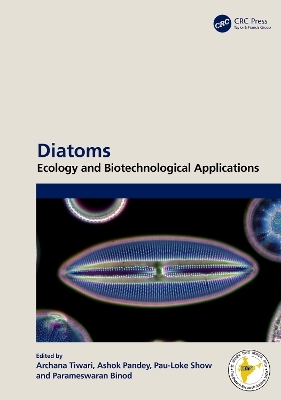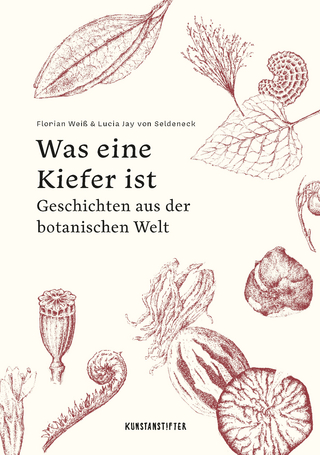
Diatoms
CRC Press (Verlag)
978-1-032-33256-7 (ISBN)
This reference book covers the ecological impact and biotechnological applications of diatoms. Diatoms contribute to 40% of primary productivity in aquatic ecosystems. They have a unique biomonitoring ability and sensitivity toward different pollutants in wastewater, and are thereby a tool for ecotoxicological monitoring. The book discusses the need for newer diatom-based indices for wastewater quality analysis. It describes the nutraceutical value of the myriad compounds like omega 3 fatty acids-DHA, polysaccharides, and phenols in diatoms. It also elaborates on the challenges in sustainable diatom biorefinery. This book is meant for microbiologists, biotechnologists, and marine biologists.
Dr. Archana Tiwari is an Associate Professor at Amity Institute of Biotechnology, Amity University, Noida, India. She obtained a Ph.D. degree from Allahabad, a Gold medalist, and a distinction holder in Botany. Her key research interests include Phycoprospecting Diatoms for wastewater remediation and high-value products. She has been working on Algal Biotechnology for two decades and the research work has been published in 70 International Journals with high impact factors. She has also authored ten books and several chapters in Springer, Wiley Blackwell, Elsevier on Algae and its applications. Prof Ashok Pandey is a Distinguished Scientist at CSIR-Indian Institute for Toxicology Research, Lucknow, India, and Honorary Executive Director at the Centre for Energy and Environmental Sustainability- India. He also holds the positions of Guest Professor in Jiangnan University, Wuxi, China; Adjunct Professor at VIT University, Vellore, Tamil Nadu; Adjunct Professor at MAC FAST, Thiruvalla, Kerala and Adjunct Professor at Kalaslingam University, Krishnan Koil, Tamil Nadu. He has been Visiting Professor/Scientist and UNESCO Professor in many countries, including France, Brazil, the UK, Switzerland, Malaysia, Thailand, etc. Formerly, he was Eminent Scientist at the Center of Innovative and Applied Bioprocessing, Mohali, and Chief Scientist & Head of Biotechnology Division at CSIR’s National Institute for Interdisciplinary Science and Technology at Trivandrum. His major research and technological development interests are in industrial and environmental biotechnology, which span from biomass to fuels & chemicals, waste to wealth/energy, industrial enzymes, the solid-state fermentation, etc. Professor Pandey has around 1200 publications/communications, including 16 patents, 54 books, 130 book chapters, 465 original and review papers. Prof Pau-Loke Show is a Professor in Biochemical Engineering from the University of Nottingham, Malaysia. His research interests cover upstream to downstream bioprocessing, microalgae technology, and circular economy. Professor Show has published over 550 research papers and more than 200 contributions to international congresses, 3 books, and a few patents that are currently applied in the industry. Prof Show has received numerous prestigious academic awards from national and international organizations. He is now serving as an Editor-in-chief in Current Nutrition & Food Science, Editor in Scientific Report, Biocatalysis and Agricultural Biotechnology, Associate Editor at Bioengineered; Current Biochemical Engineering, and Editorial board member in several journals. Dr. Parameswaran Binod is a Principal Scientist in the Microbial Processes and Technology Division of CSIR-National Institute for Interdisciplinary Science and Technology, Trivandrum, India. He obtained Ph.D. in Biotechnology from the University of Kerala, Thiruvananthapuram, India. He worked as a Post-doctoral fellow at the Korea Institute of Energy Research, Daejeon, South Korea. He joined as a scientist at the CSIR-National Institute for Interdisciplinary Science and Technology, Thiruvananthapuram, India. He has more than 140 publications to his credit. His name is listed in the world’s top two percent scientists as per a study by Stanford University and Elsevier in the year 2020. He is a recipient of several awards and fellowships including the Young Scientist Award from International Forum on Industrial Bioprocesses (IFIBiop), France, Kerala State Young Scientist Award from Kerala State Council for Science, Technology, and Environment, Prof S B Chincholkar Memorial Award of the Biotech Research Society, India, Elsevier Impactful Research Award, Elsevier Renewable Energy Best Paper Award, Visiting Fellowship, EPFL, Switzerland, Marie Curie Fellow, etc. He is a Fellow of the International Society for Energy, Environment and Sustainability (ISEES). He is a National Honorary Advisory Board Member of Centre for Energy and Environmental Sustainability (CEES), India, and Central Office Executive of The Biotech Research Society, India.
1. Diatom Taxonomy: New Insights, 2. Diatom High Cell Density Culturing: Challenges and Prospects, 3. Ecological Impact of Diatoms: Mitigation to Indicators, 4. Estuarine Diatom Community Dynamics due to Sedimentation Changes, 5. Carbon Dioxide Mitigation by Diatoms, 6. Aquatic Role of Diatoms: From Primary Producers and Aquafeeds, 7. Climate Change and Diatoms, 8. Diatoms: Systematics to Nanobiotechnology, 9. Cultivation of Diatoms in Photobioreactors
| Erscheinungsdatum | 16.09.2023 |
|---|---|
| Zusatzinfo | 14 Tables, black and white; 13 Line drawings, color; 4 Line drawings, black and white; 7 Halftones, color; 1 Halftones, black and white; 20 Illustrations, color; 5 Illustrations, black and white |
| Verlagsort | London |
| Sprache | englisch |
| Maße | 178 x 254 mm |
| Gewicht | 480 g |
| Themenwelt | Naturwissenschaften ► Biologie ► Botanik |
| Naturwissenschaften ► Biologie ► Ökologie / Naturschutz | |
| Technik | |
| Weitere Fachgebiete ► Land- / Forstwirtschaft / Fischerei | |
| ISBN-10 | 1-032-33256-5 / 1032332565 |
| ISBN-13 | 978-1-032-33256-7 / 9781032332567 |
| Zustand | Neuware |
| Informationen gemäß Produktsicherheitsverordnung (GPSR) | |
| Haben Sie eine Frage zum Produkt? |
aus dem Bereich


